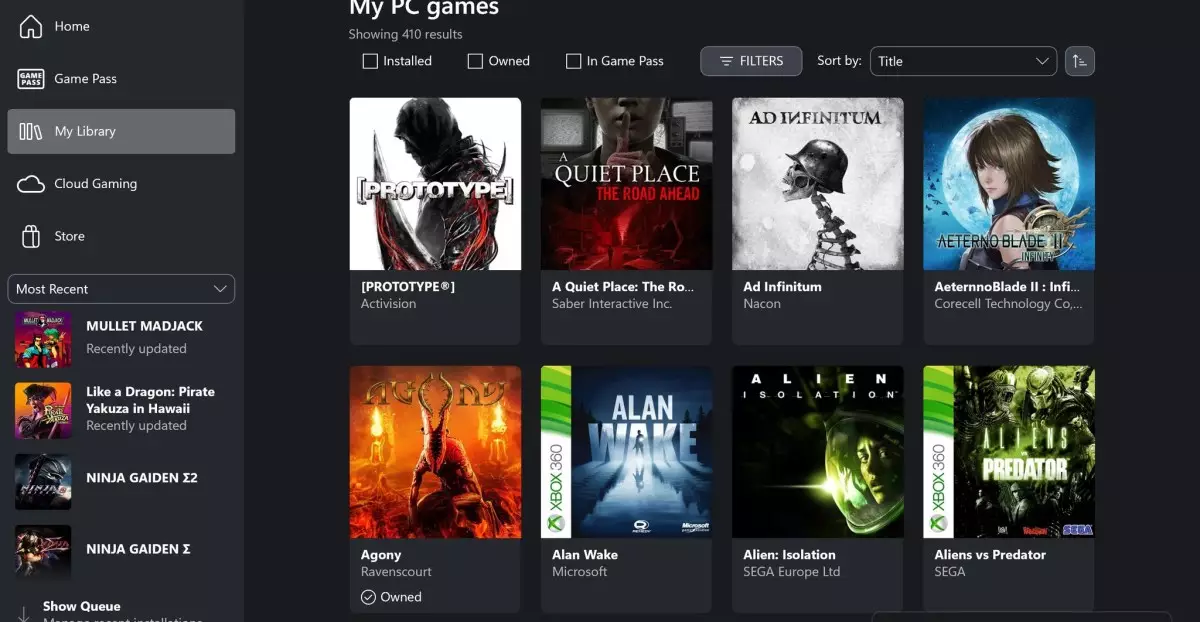In recent weeks, a notable transformation has been unfolding at Microsoft, indicating a strategic shift towards harmonizing the Xbox and Windows ecosystems. For a long time, gamers have navigated a fragmented experience, toggling between separate platforms to access their games. However, the latest updates to the Xbox app on Windows suggest that a revolutionary change may be on the horizon, paving the way for a more cohesive gaming library.
The Xbox PC app has begun to showcase console games within its library—an unexpected twist that could signify a major overhaul rather than a mere technical glitch. This anomaly prominently marked the appearance of classics like “Alan Wake” for Xbox 360, underscoring the growing possibility of a universal gaming platform where console and PC titles coexist seamlessly. Such a step is, undoubtedly, a reflection of Microsoft’s broader ambitions to merge its gaming services, creating an integrated library that caters to a variety of devices.
A Vision of Universal Accessibility
Tom Warren, a seasoned tech journalist, shed light on Microsoft’s vision for the future through his profound insights. According to reports, the company is eyeing a collaboration with hardware makers like Asus to introduce portable gaming devices under the “Project Kennan” initiative. This move not only emphasizes Microsoft’s aspiration to dominate the gaming landscape but also enhances the concept of universal accessibility for all gamers. The push to link Xbox and PC signifies a trend where Windows is not merely an operating system but a gaming hub supporting various titles across platforms.
In addition to consolidating Xbox console games within the app, plans are illustrated to feature games from other major players in the industry, such as Steam and Epic Games Store. This is no minor feat; it highlights a key strategy in making the Xbox app the primary platform for gamers on PC. By allowing game visibility across these competitive services, Microsoft is not just enhancing user experience; it is leveling the playing field and challenging the app store paradigm set by traditional platforms.
Overhauling the Xbox Brand Identity
The recent rebranding of the Xbox PC app to simply “Xbox PC” hints at a formidable transition. By streamlining the branding, Microsoft is strategically positioning the app to become synonymous with PC gaming. This shift was highlighted with the announcement of new titles like “Gears of War: Reloaded,” suggesting that Microsoft envisions a future where its games are not just played, but celebrated across all platforms.
Yet, the acquisition of SteamOS-powered devices by competing brands like Lenovo points to a brewing urgency within Microsoft. The introduction of handheld gaming systems equipped with a user-friendly interface aligns with their plan to strengthen the Xbox brand. This push not only responds to current competition, but it also accounts for the anticipated evolution of gaming habits worldwide. Thus, a unified Xbox and Windows interface may be a game-changer for attracting a broader audience, especially casual gamers seeking convenience.
The Future of Cloud Gaming with Microsoft
However, the larger question remains—will Xbox console games be fully playable on PC? Microsoft must navigate the complexities of cloud infrastructure and potentially explore innovative emulation technologies to allow gamers to relive their cherished titles on modern hardware. As cloud gaming gains traction, more companies are vying to provide seamless gaming experiences that transcend hardware limitations.
In this context, Microsoft’s efforts to leverage its existing cloud capabilities could redefine the idea of backward compatibility. Should they succeed in making legacy Xbox games playable on PCs, it would not only satisfy nostalgic gamers but also solidify Microsoft’s foothold in the industry. A comfortable blend of hardware stability, robust cloud services, and an expansive library could set the new standard for gaming experiences in the years to come.
Microsoft is in the midst of a transformative journey that could redefine the gaming landscape as we know it. By amalgamating Xbox and Windows, they are setting the stage for a future where accessibility, community, and innovation converge, propelling both casual gamers and enthusiasts into new realms of gaming possibility. The next few years may witness Microsoft not just as a competitor but as a catalyst for change in the entire gaming ecosystem.


Leave a Reply